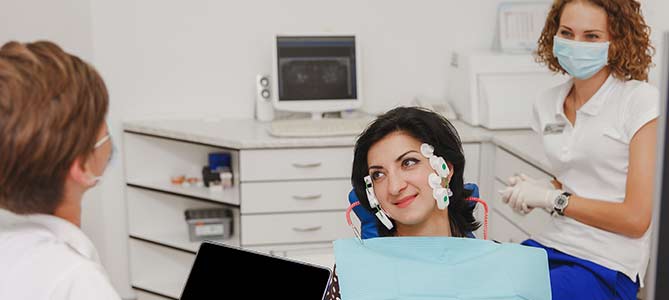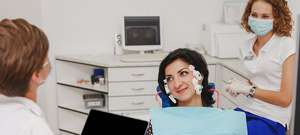Neuromuscular Dentist Serving Bay Area, San Jose, CA
The purpose of neuromuscular dentistry is to correct the bite and alleviate TMJ dysfunction symptoms like lockjaw or “jaw popping”. Trust the experienced dentist of Selective Dental in San Jose, CA. For more information, contact us today or schedule an appointment online. We are conveniently located at 3151 South White Road, Suite 203 San Jose, CA 95148.


Table of Contents:
What does a neuromuscular dentist do?
What are common neuromuscular disorders?
What are the symptoms of neuromuscular disability?
How do I know if I have neuromuscular disorders?
Neuromuscular dentistry is a very important field of dentistry that views and treats dental health as a system with many different, literally moving parts. The health of a patient’s teeth also depends on the health of the muscles of the jaw and embouchure and the surrounding soft tissue. Many neuromuscular disorders may affect the functioning of the facial muscles, and there are many other small nerves and muscles to be aware of within the face when diagnosing or treating these disorders. It is important to have a dentist who understands dentistry as more than teeth and gums and can approach dental health as a cooperative system that relies on all of the other parts to function to maintain the health of all of the other parts.
Neuromuscular dentists are dentists with specialties focused on how the muscles and nerves work with the jaw, teeth, and gums to ensure the mouth is functioning properly. They are familiar with treating dentistry as the mouth as a system rather than just focusing on the teeth and gums. Neuromuscular disorders can affect the nerves or muscles within the mouth and can affect how well the patient can perform daily dental hygienic activities such as brushing their teeth or flossing.
The primary focus of neuromuscular dentists is to ensure proper alignment of their patients’ jaw and that it is in the correct position to properly open and close. It is essential to have a proper “bite” to have a healthy mouth. They will often ease tension on the joints around the jaw by relaxing the muscles to help relieve patients of disorders such as temporomandibular and malocclusion (also known as a crossbite). So much of our quality of life can be determined by what we are able to eat, so it is incredibly important that we are able to make sure that we receive the proper care for our mouths and jaws if any neuromuscular disorders develop which may affect how our jaws function.
While there are many different types of neuromuscular disorders, a few of the more common ones include botulism, congenital myopathies, motor neuron disease, and amyotrophic lateral sclerosis (commonly known as ALS). The most common of neuromuscular disorders is the autoimmune disease myasthenia gravis, which happens when antibodies are produced by the immune system to prevent transmission of nerve impulses to muscles by attaching themselves to the neuromuscular junction.
However, there exist neuromuscular disorders that only affect the joints and muscles in the jaw, which is what neuromuscular dentists treat. These disorders include temporomandibular disorder (TMD) and malocclusion, or any other neuromuscular disorder in which the positioning of the jaw is affected.
Since neuromuscular disorders occur when the neurons and muscles aren’t communicating properly, most of the symptoms have to do with muscles either weakening or just not receiving signals from the neurons at all, so not functioning whatsoever. When the muscles weaken, they could start twitching, cramping, being more painful than normal, or just start to diminish from not being used. If the muscles are not being alerted by the neurons properly, it can also lead to the patient having movement or balance problems, or troubles with actions we don’t often have to think about such as swallowing or breathing. Patients may also experience a lack of control over facial muscles, leading to drooping of the eyelids for example, double vision can also occur, as well as tingling, numbness, or painful sensations.
To find out if you have a neuromuscular disorder, you will have to go to a medical professional to get a blood test, muscle biopsy, spinal tap, Magnetic Resonance Imaging (an MRI), or genetic testing. However, the most common way to check patients for a neuromuscular disorder is through electromyography, which is when the medical professional will use very fine electrodes to poke through tissue into muscles to test the electrical currents of the neurons that should be firing to that muscle.
More specifically, neuromuscular dentists will also use electromyography to test the functioning of jaw muscles, but may also use a sonography (which measures vibrations during opening and closing of the jaw), or jaw tracking, which is a 3-D model of the jaw drawn magnetically to help identify if there are any visible abnormalities.
Call us today for more information. We serve patients from all over Santa Clara County CA: San Jose, Milpitas, Santa Clara, Campbell, Sunnyvale, Cupertino, Saratoga, Los Gatos, and beyond!

Additional Services You May Need
- Dental Implants
- Dental Bridges
- Dental Crowns
- Gum Disease Treatment
- Smile Makeover
- Root Canal Therapy
- Teeth Whitening
- Dental Cleanings
- Veneers
- Cracked Tooth Treatment
- Emergency/Same-Day Services
- General Dentistry
- Cosmetic Dentistry
- Family Dentistry
- Children Dentistry
- Aesthetic Dentistry
- TMJ Treatment
- Extractions
- Emergency Dental Appointments
- Mouth Guards and Night Guards
- Ortho Retainers
- Dental Implant Crowns

Additional Services You May Need
- Dental Implants
- Dental Bridges
- Dental Crowns
- Gum Disease Treatment
- Smile Makeover
- Root Canal Therapy
- Teeth Whitening
- Dental Cleanings
- Veneers
- Cracked Tooth Treatment
- Emergency/Same-Day Services
- General Dentistry
- Cosmetic Dentistry
- Family Dentistry
- Children Dentistry
- Aesthetic Dentistry
- TMJ Treatment
- Extractions
- Emergency Dental Appointments
- Mouth Guards and Night Guards
- Ortho Retainers
- Dental Implant Crowns






